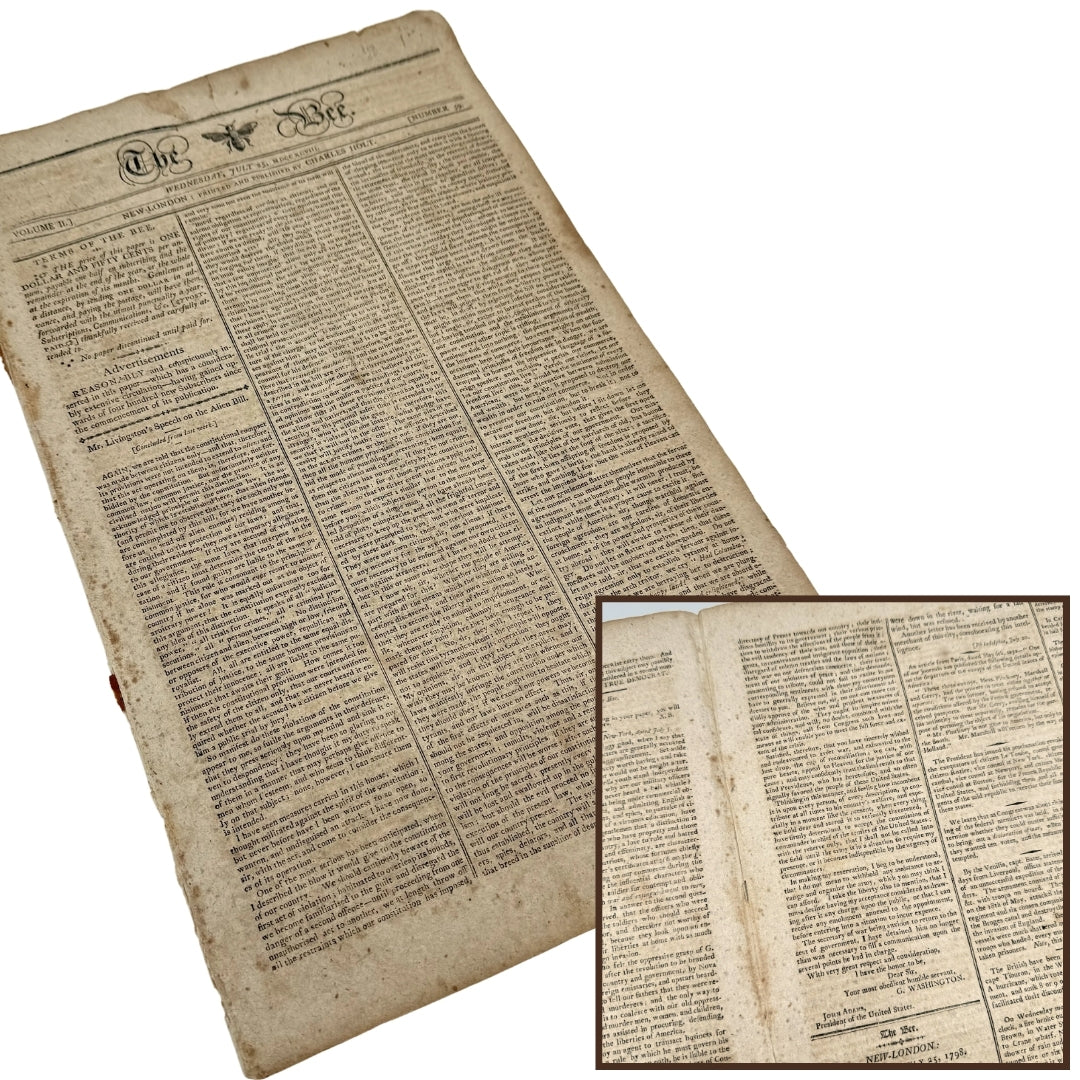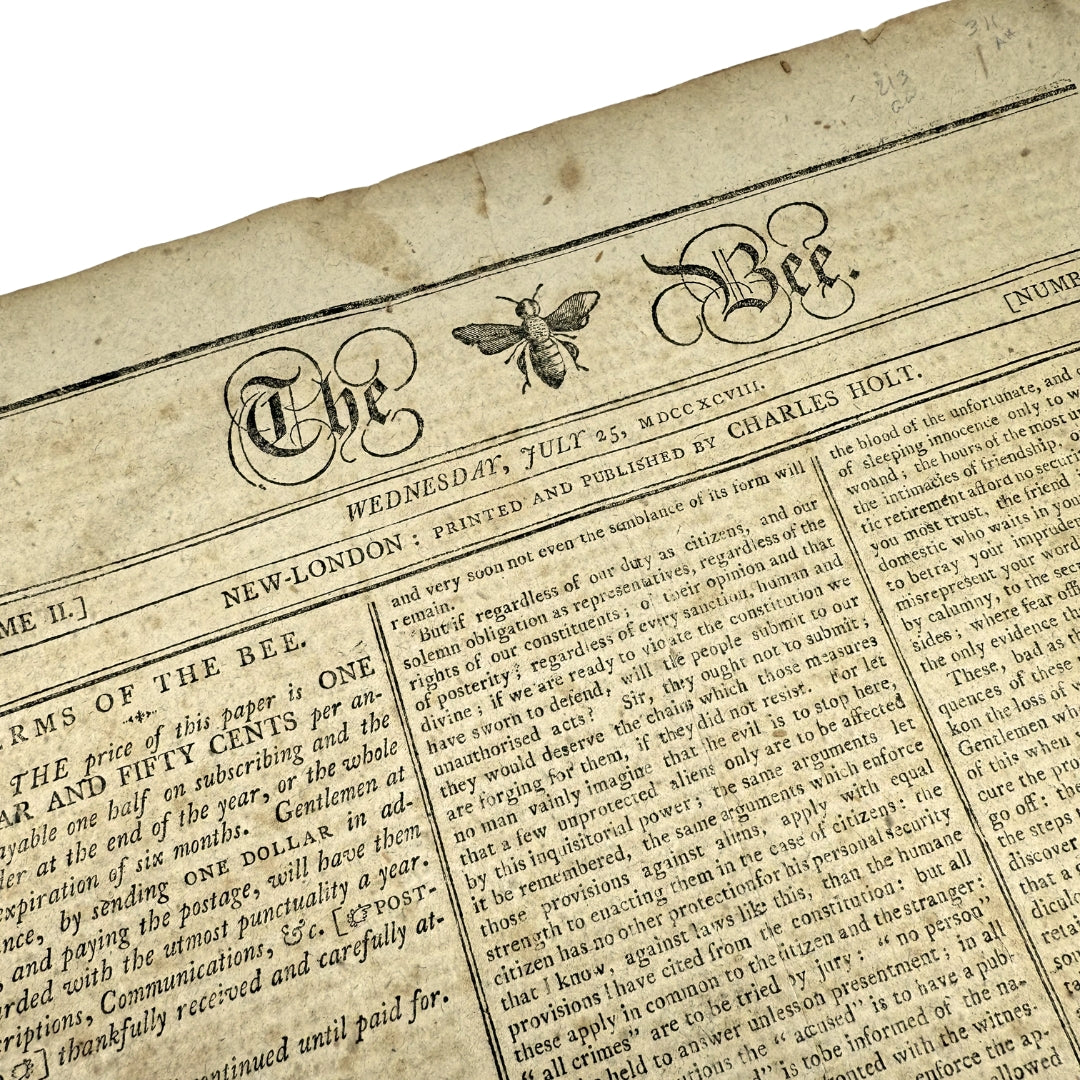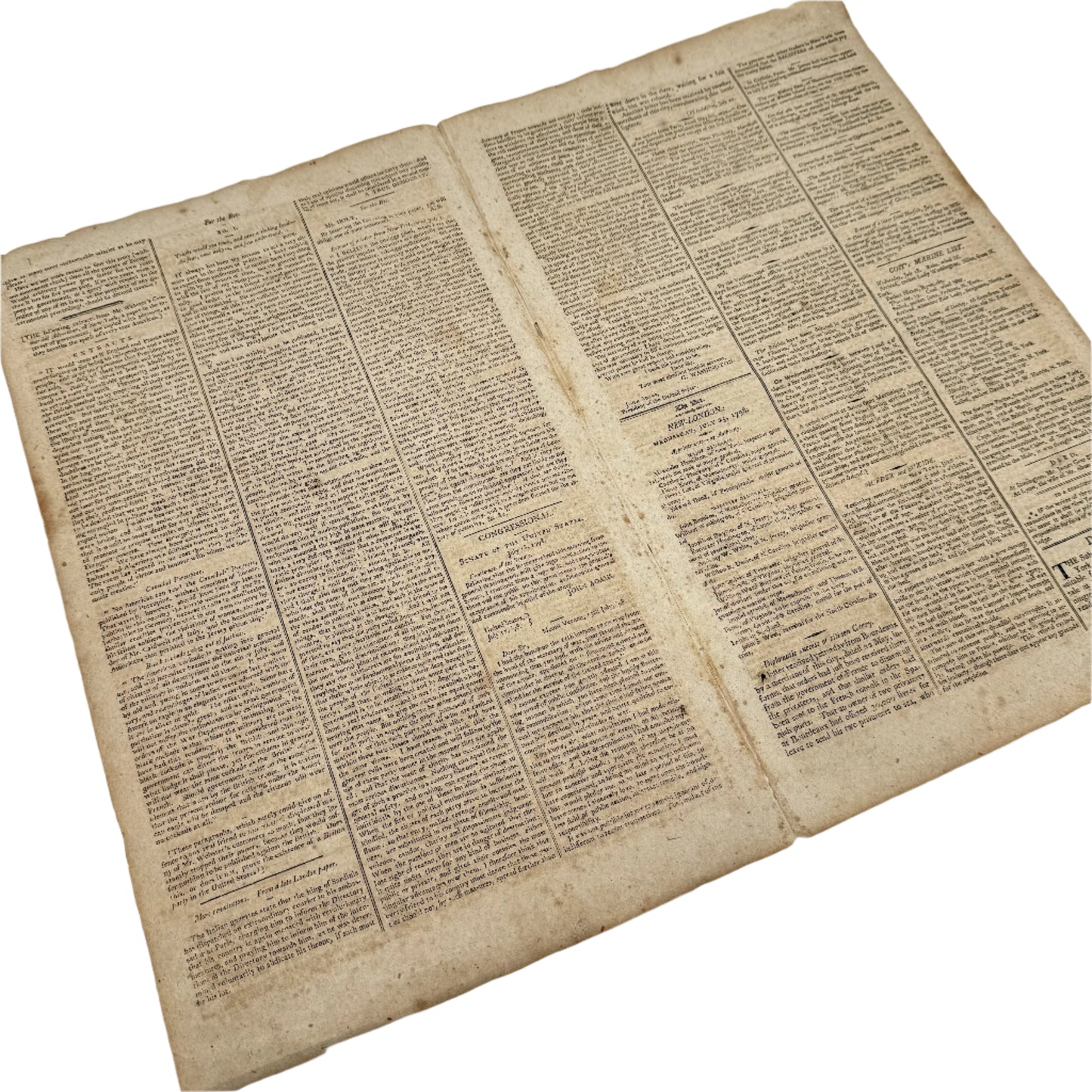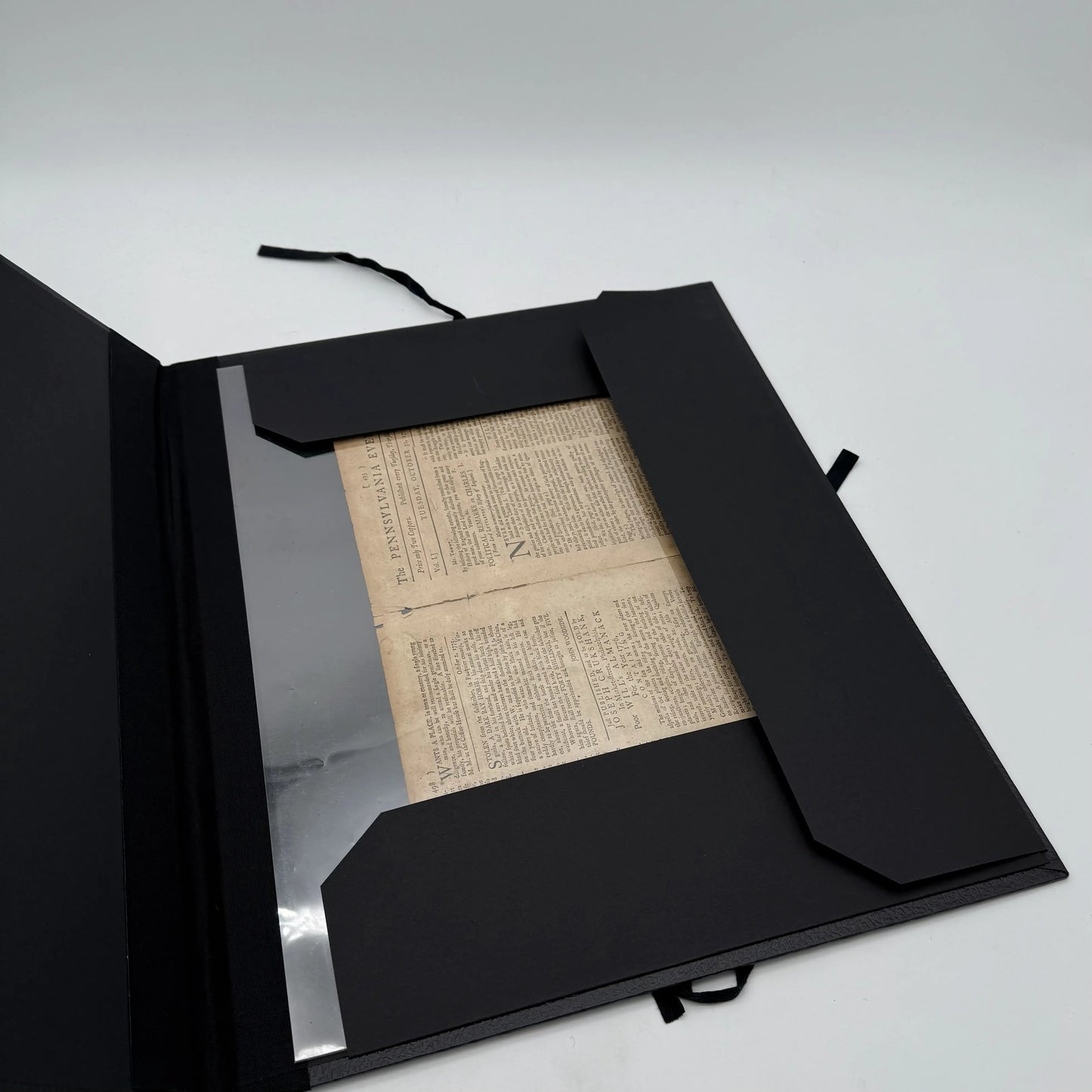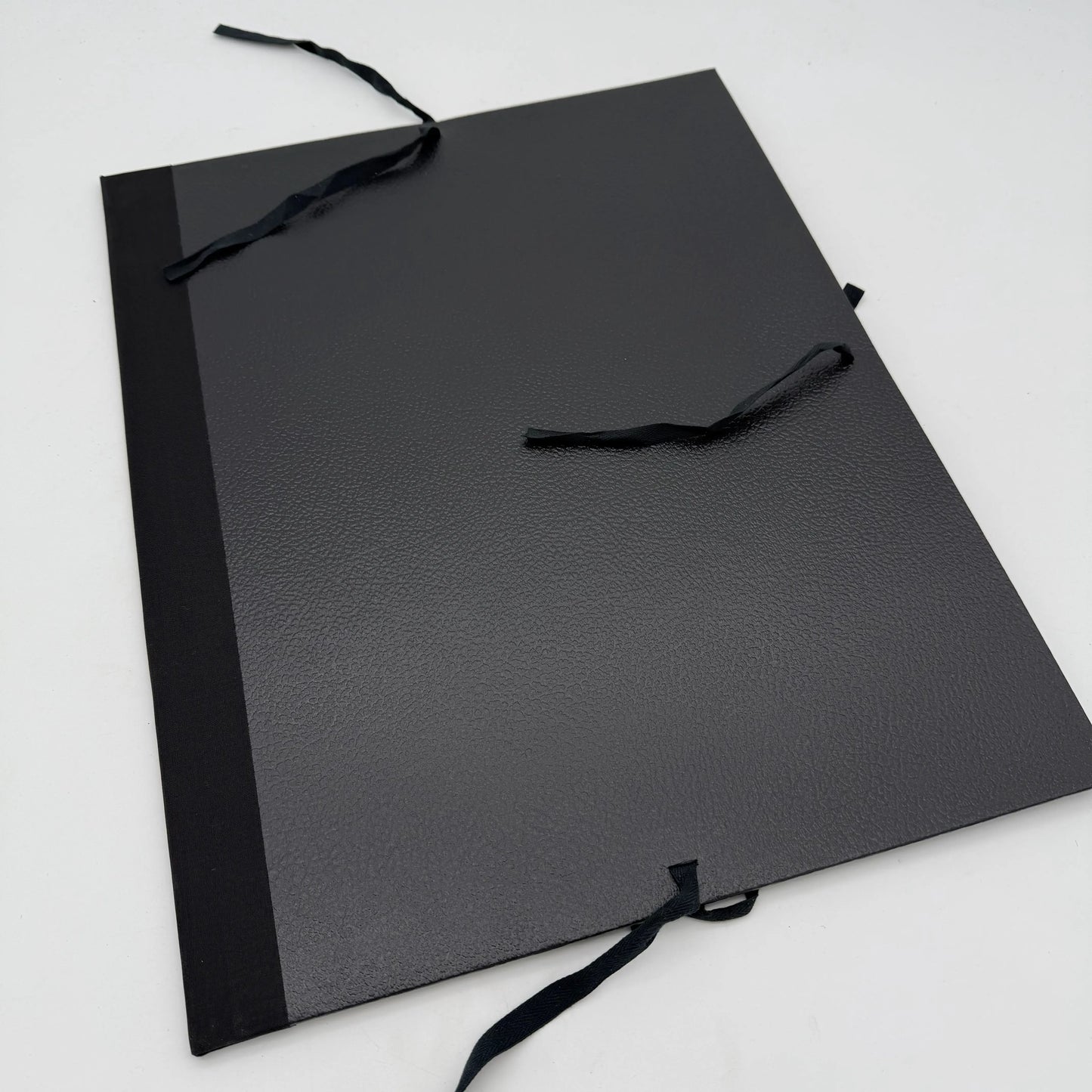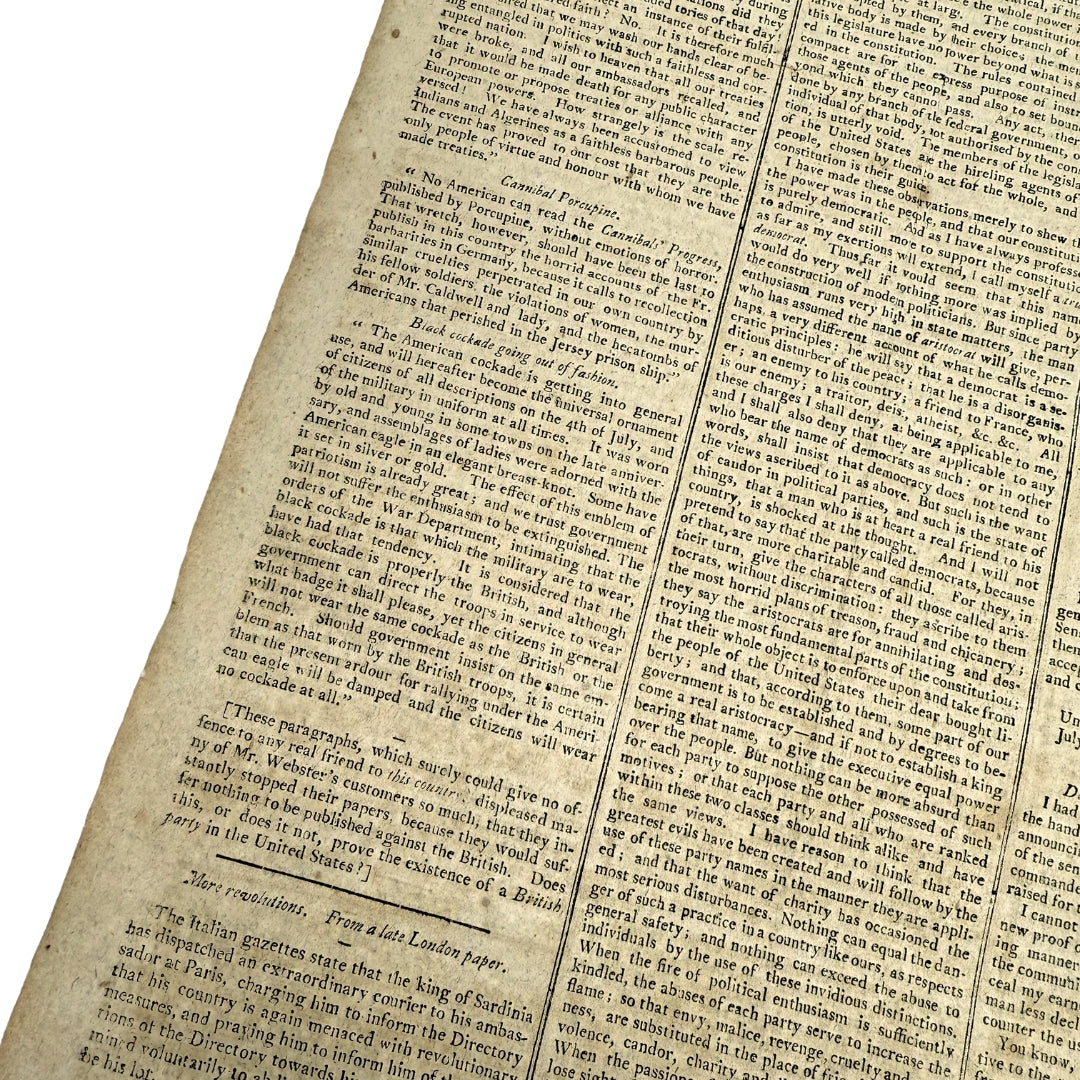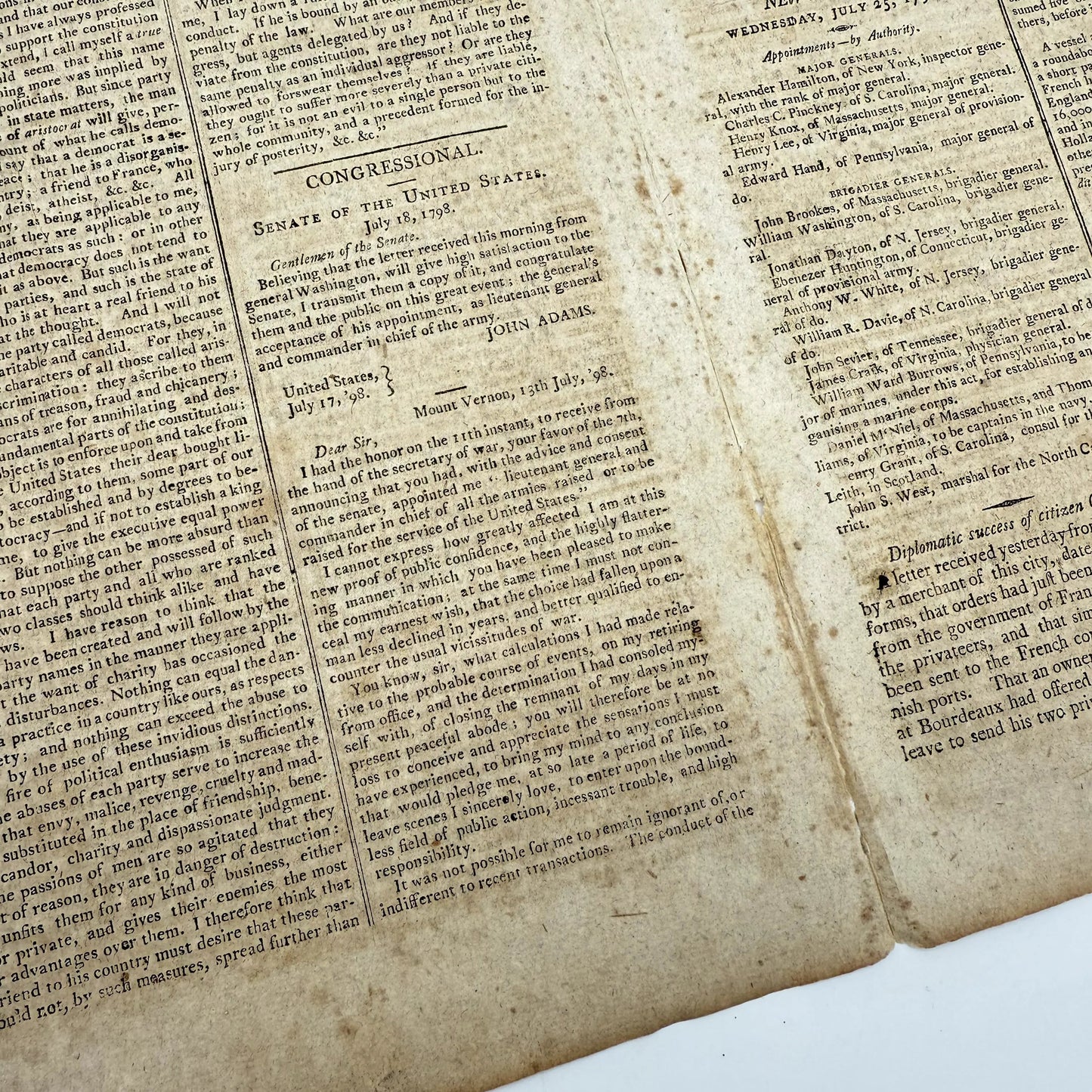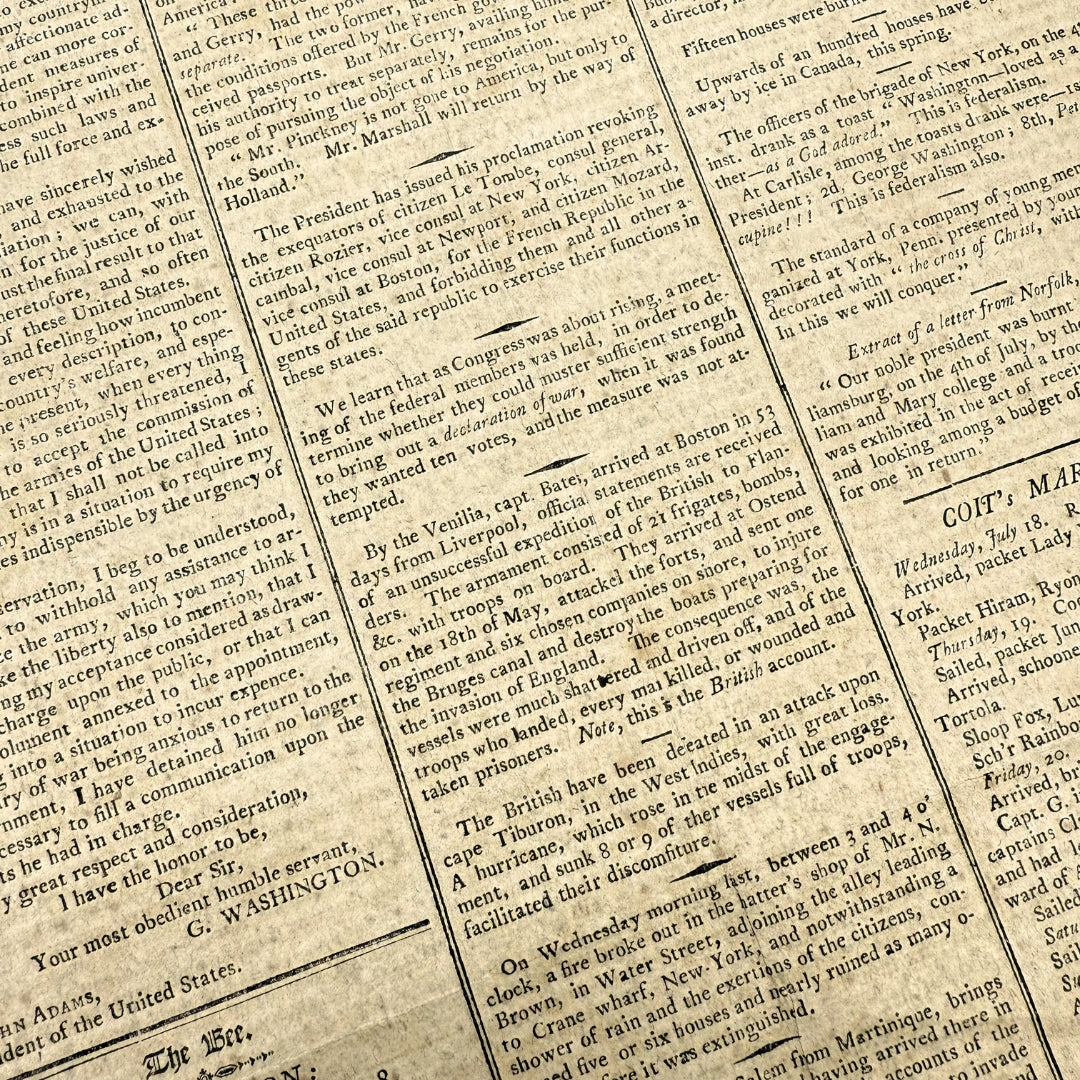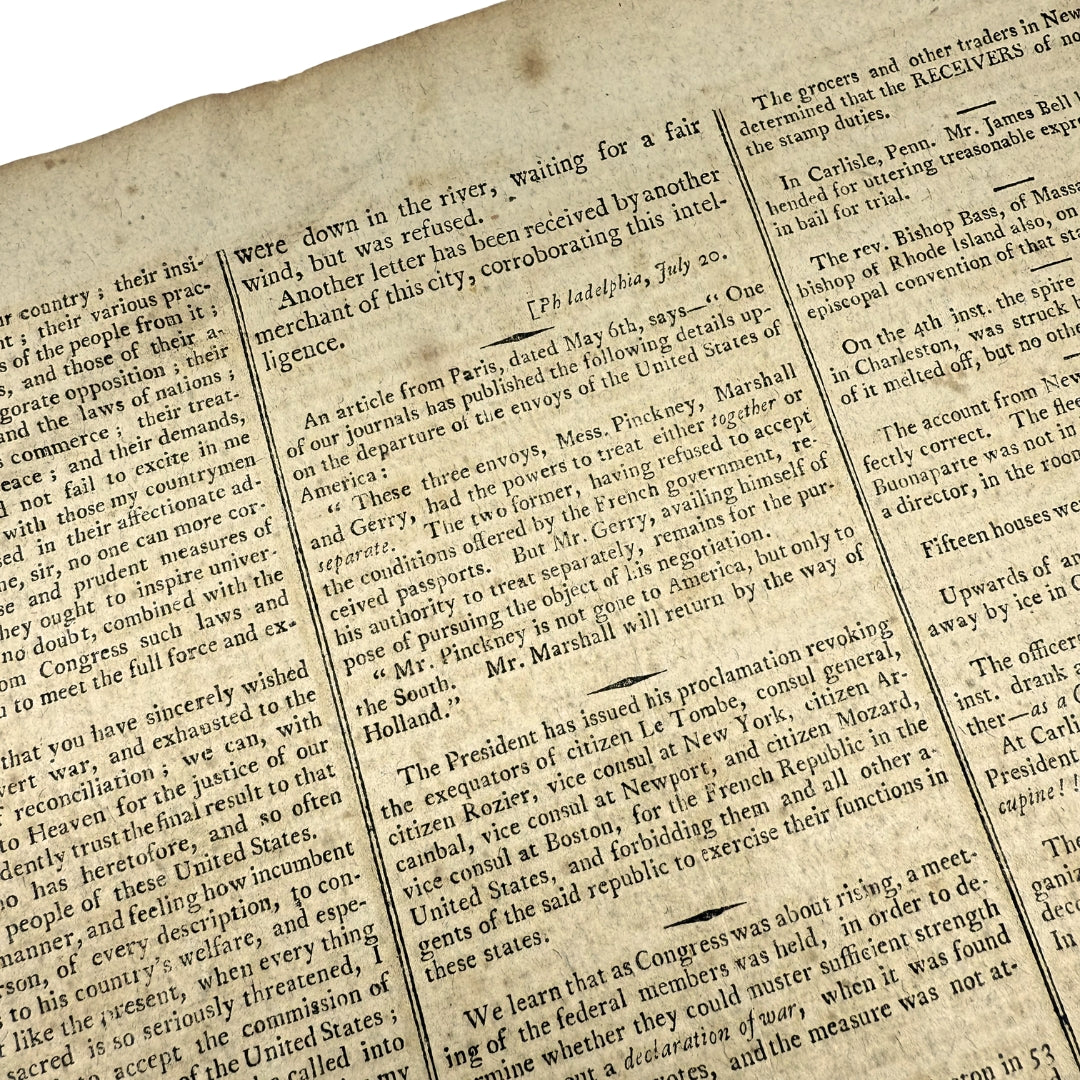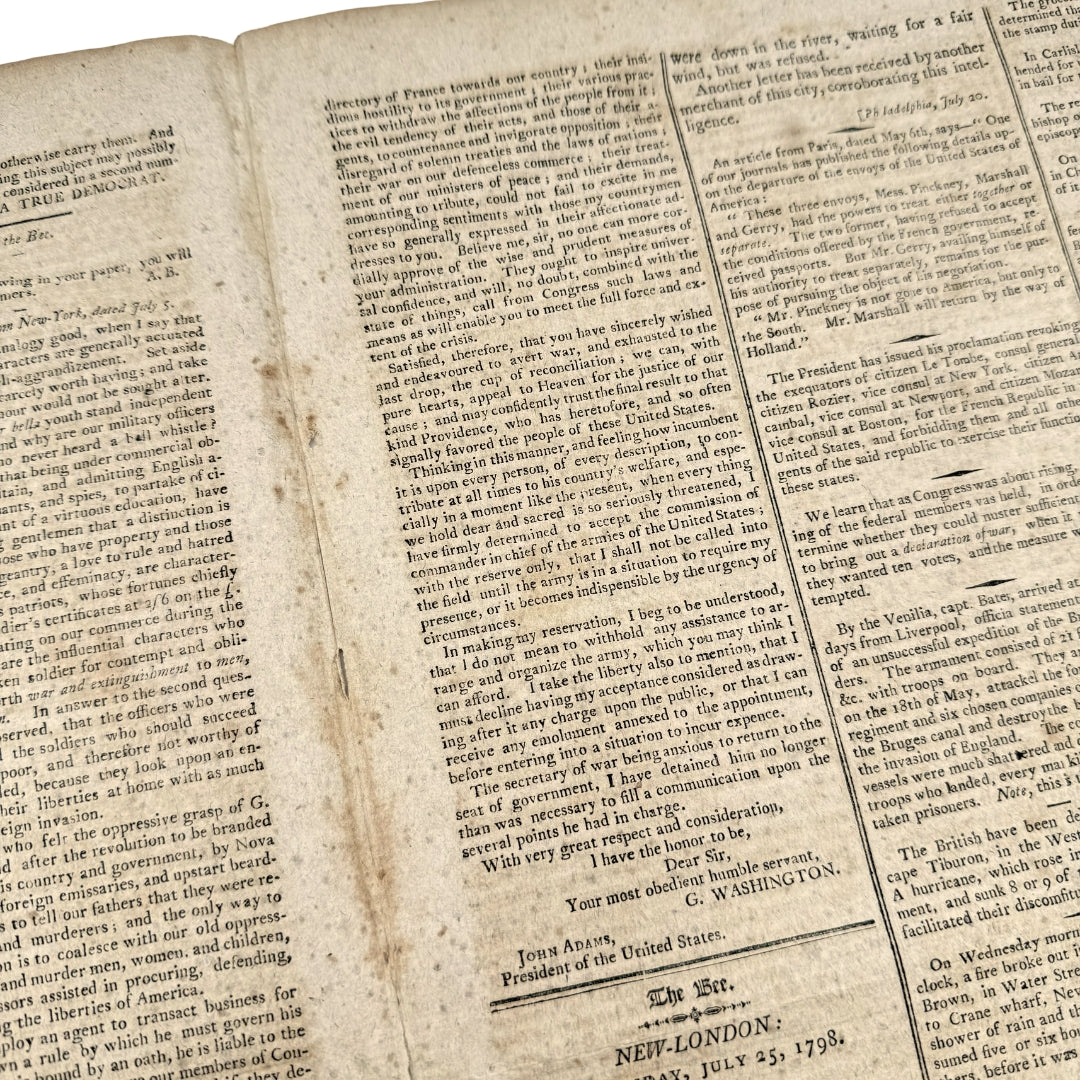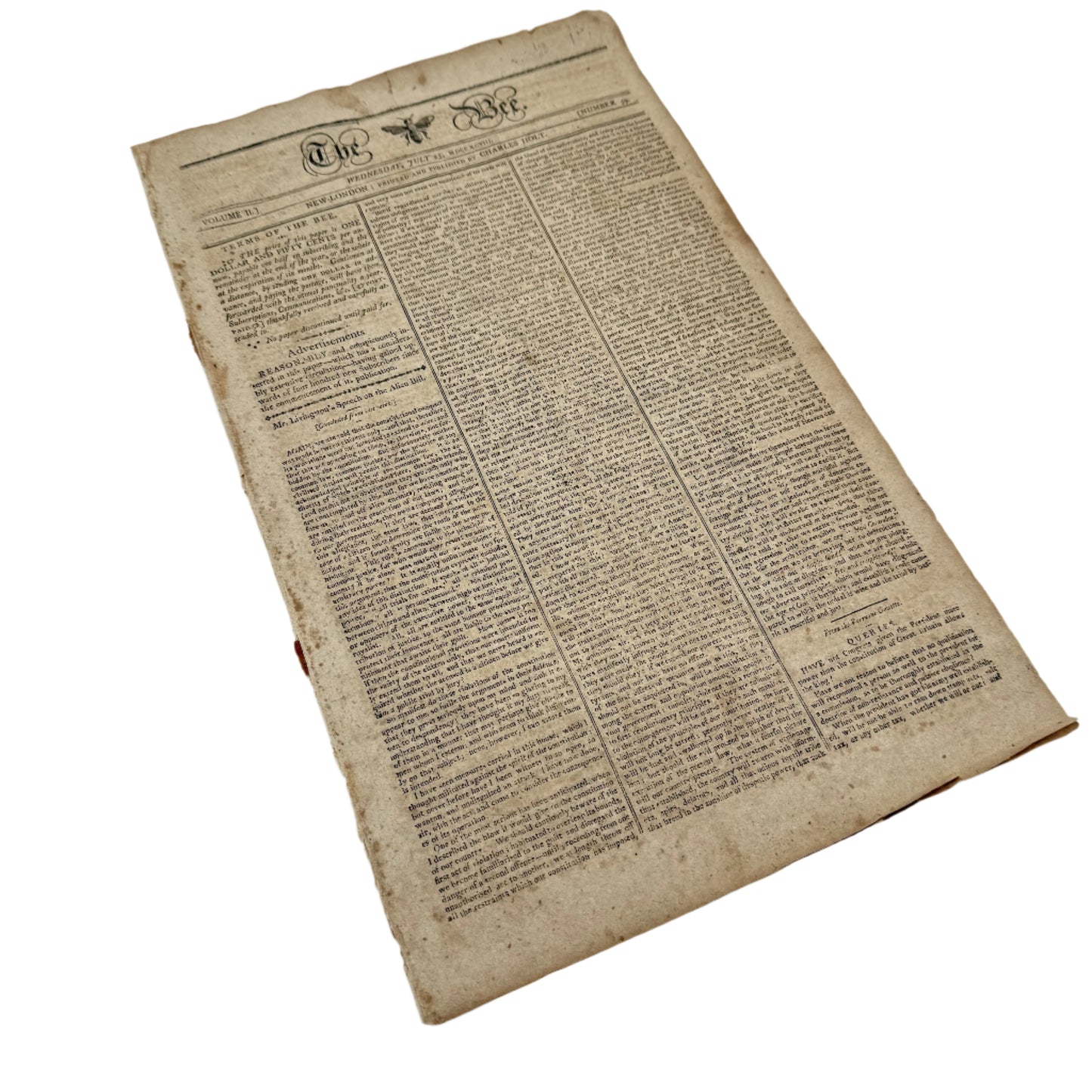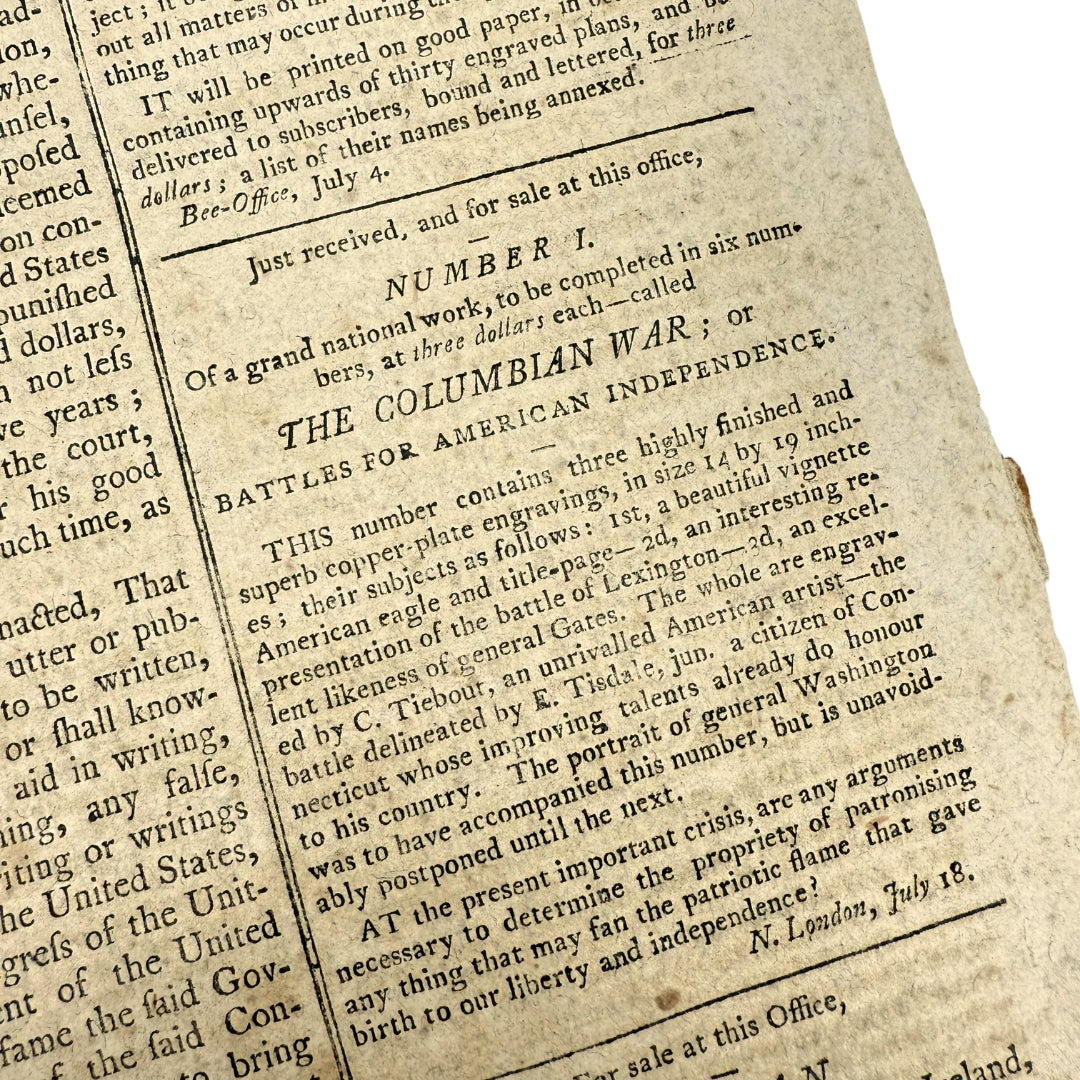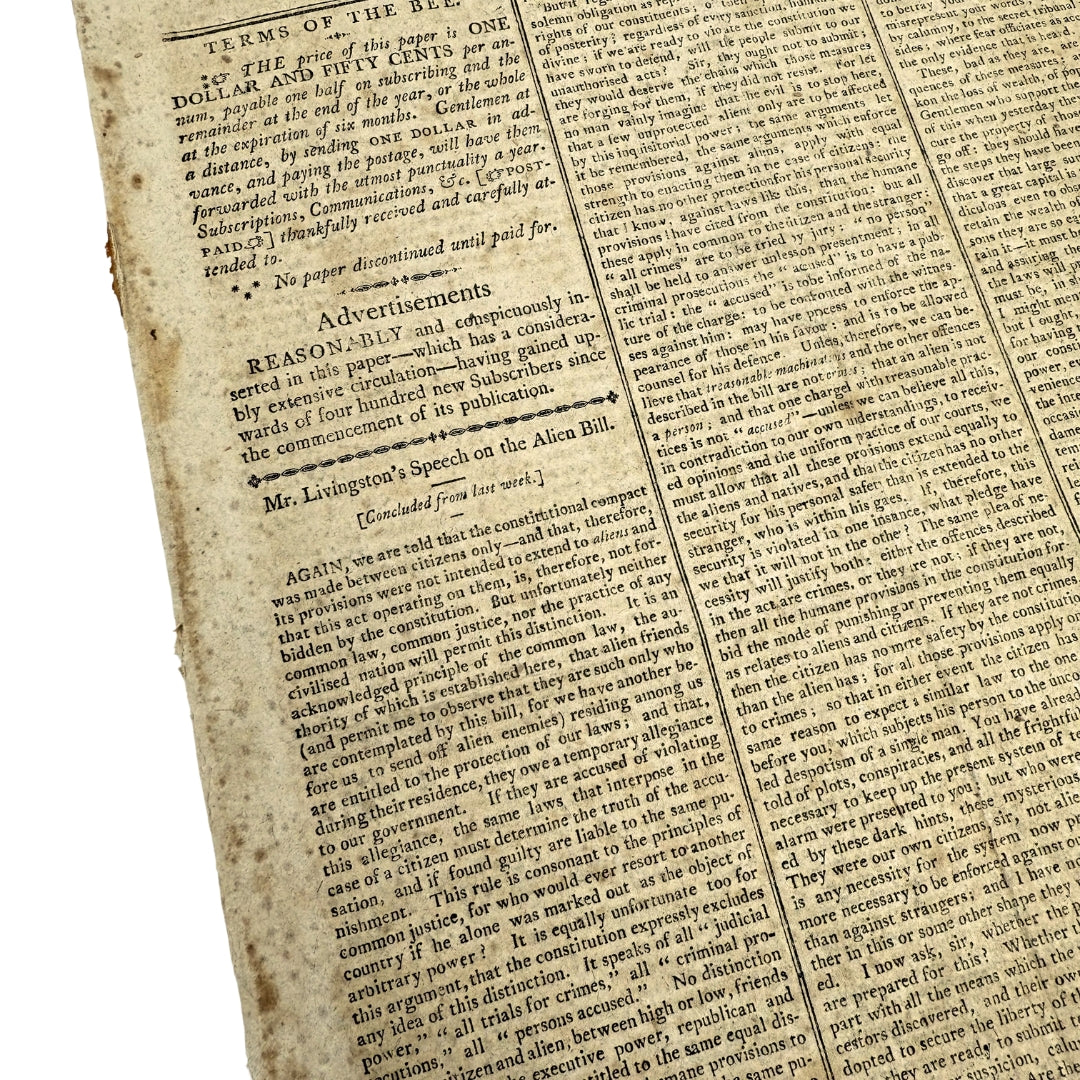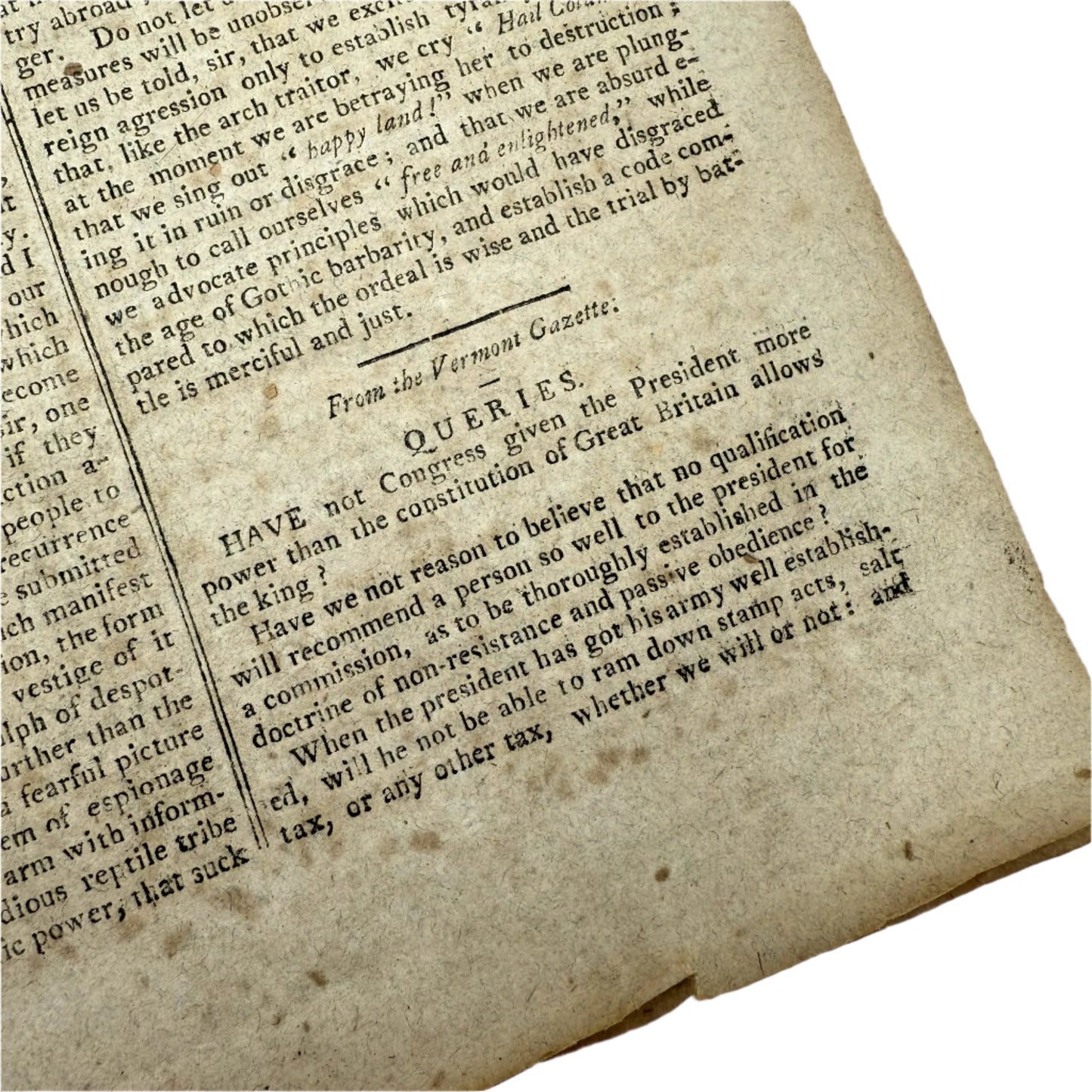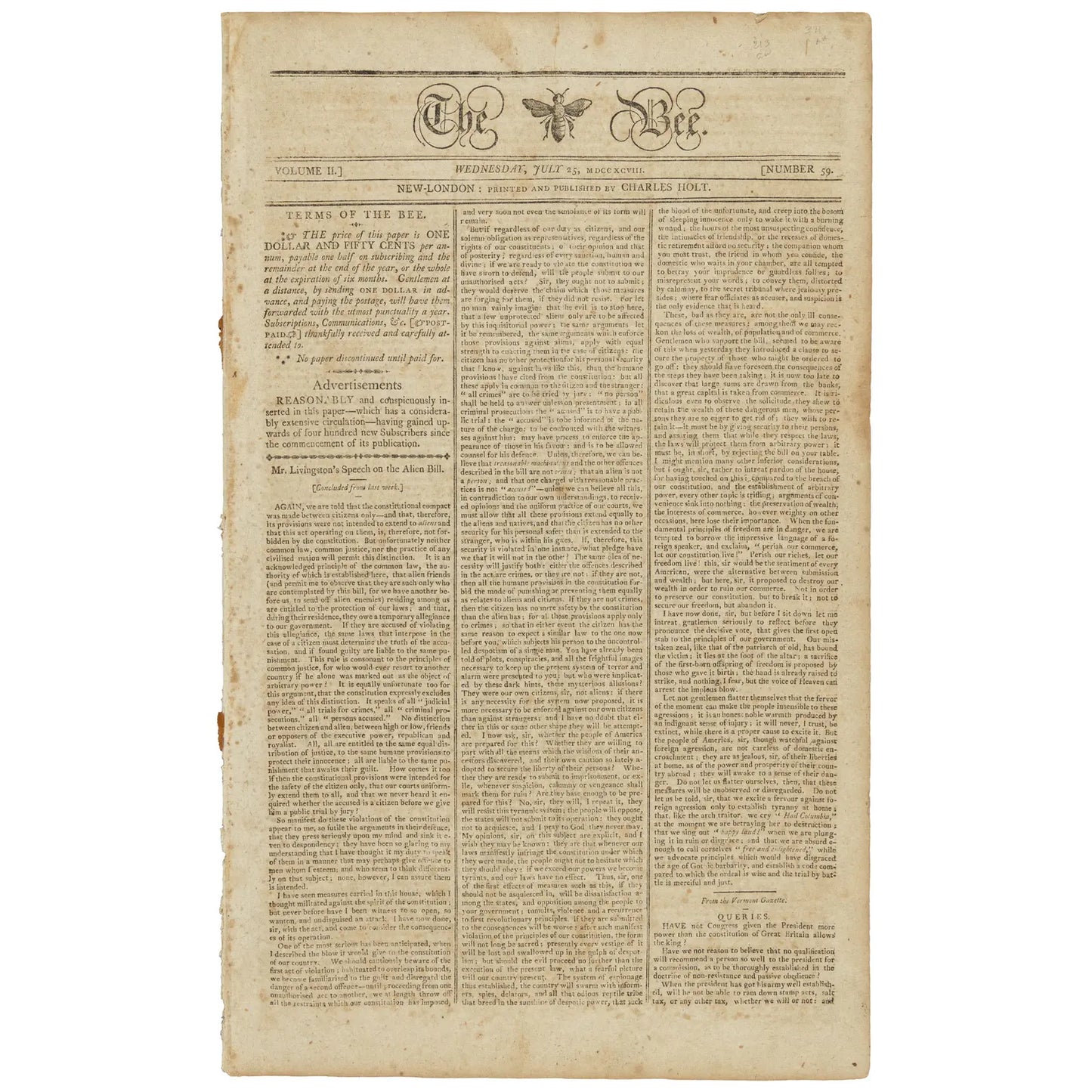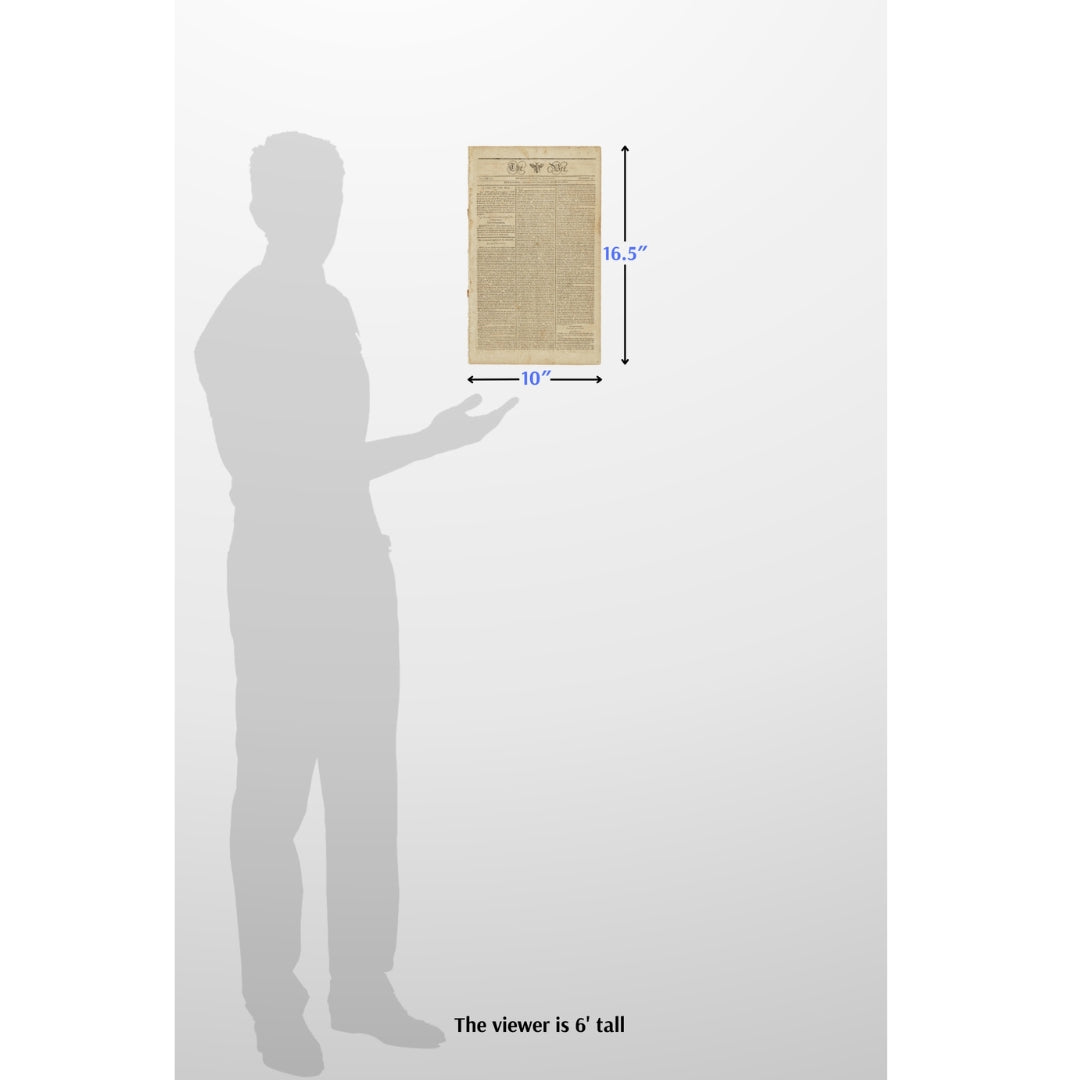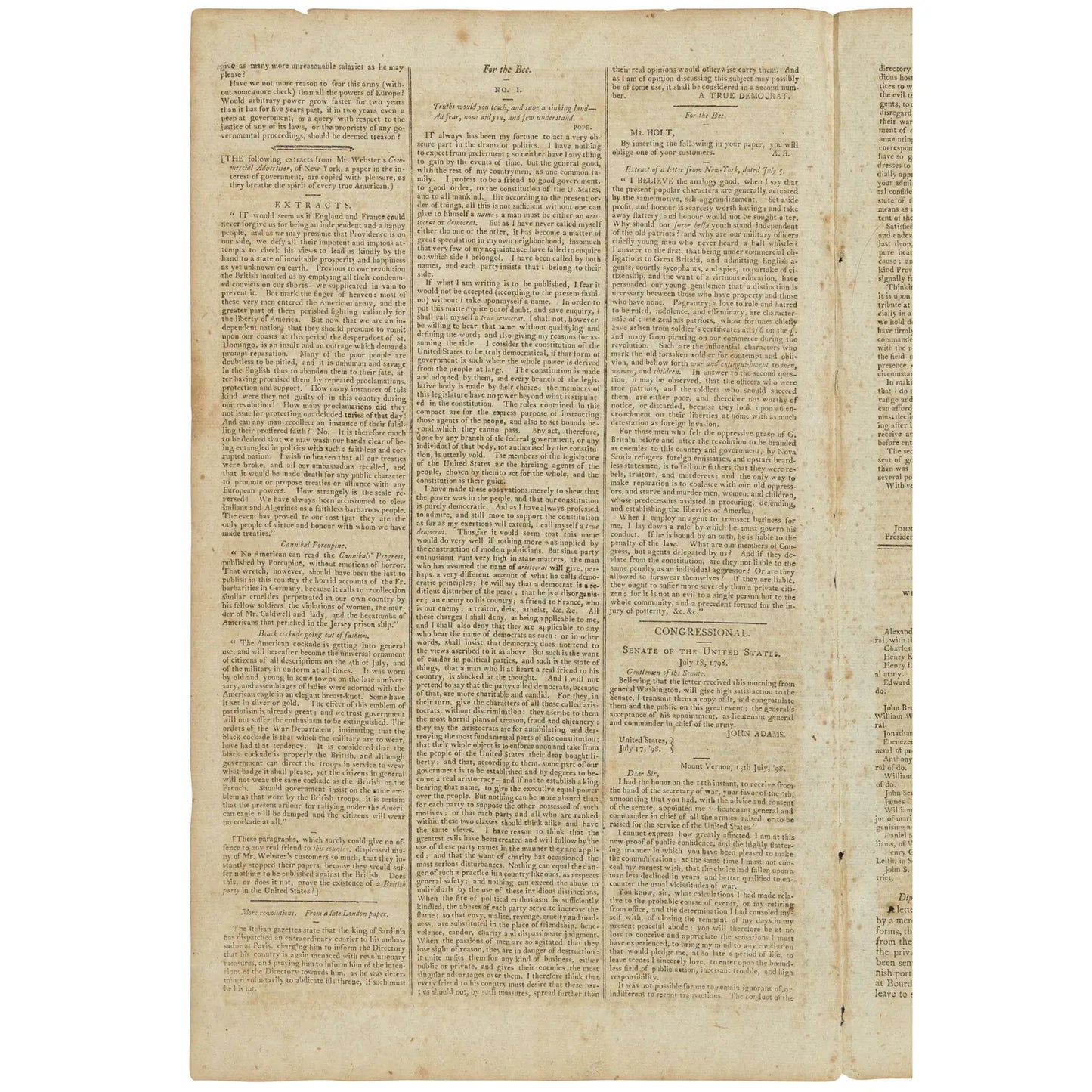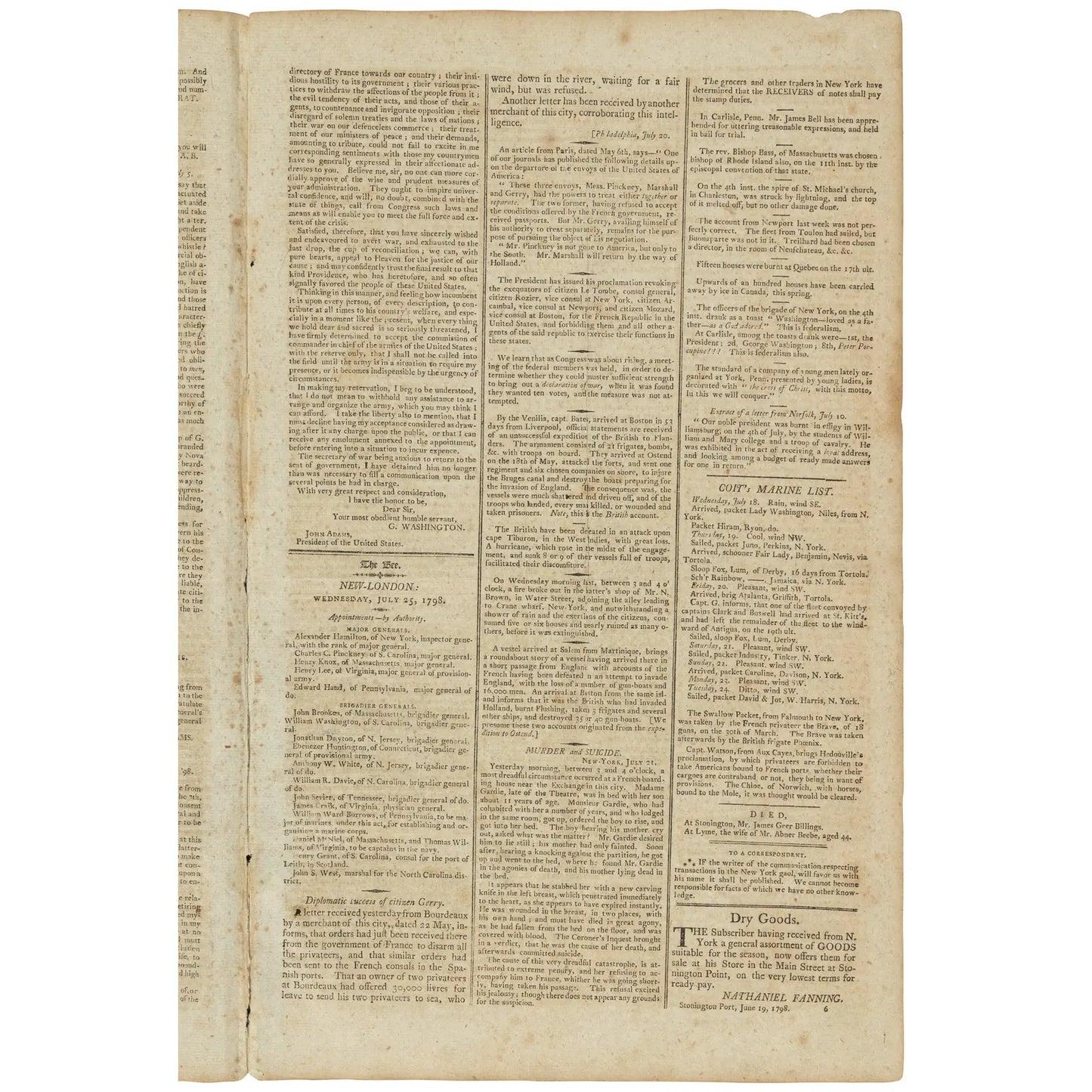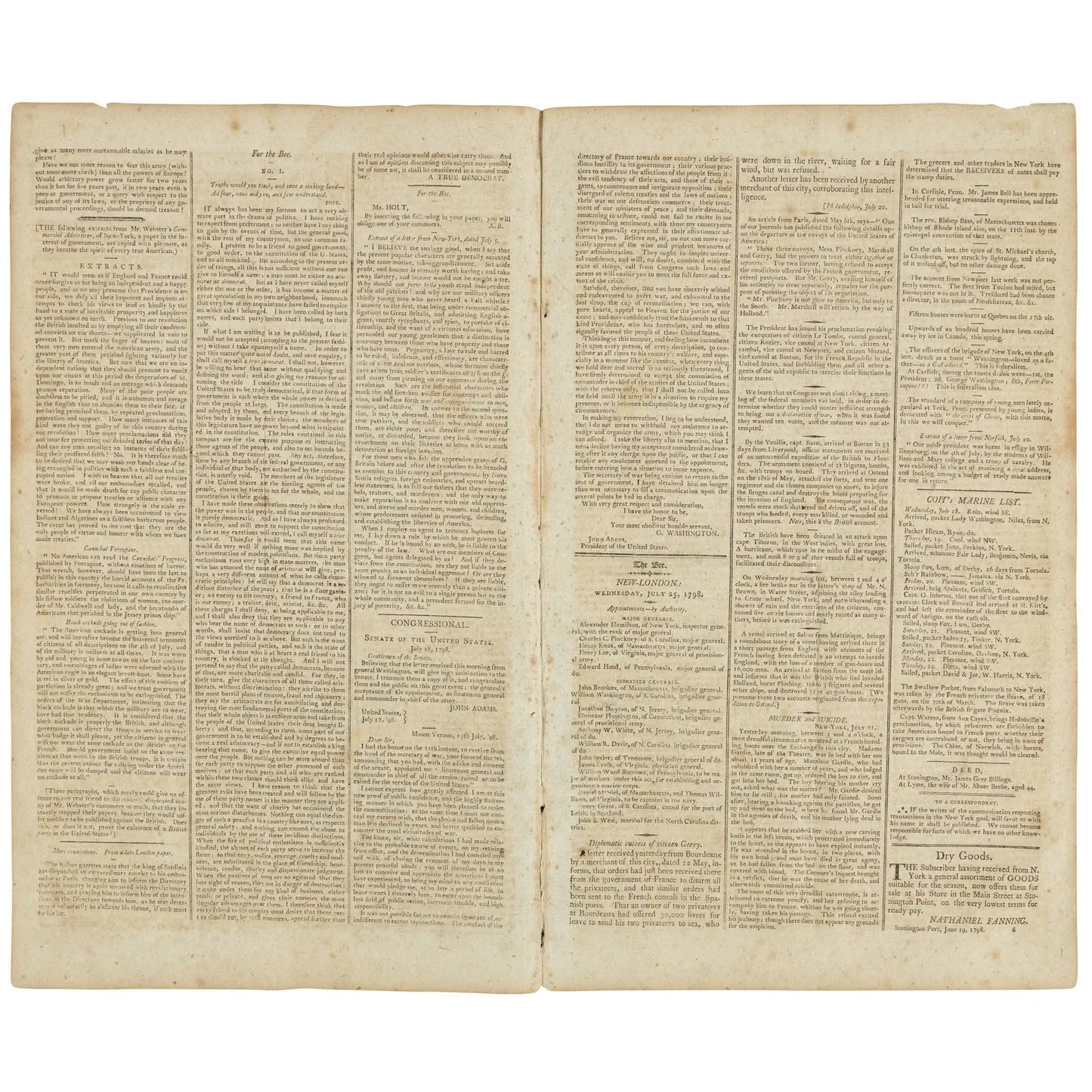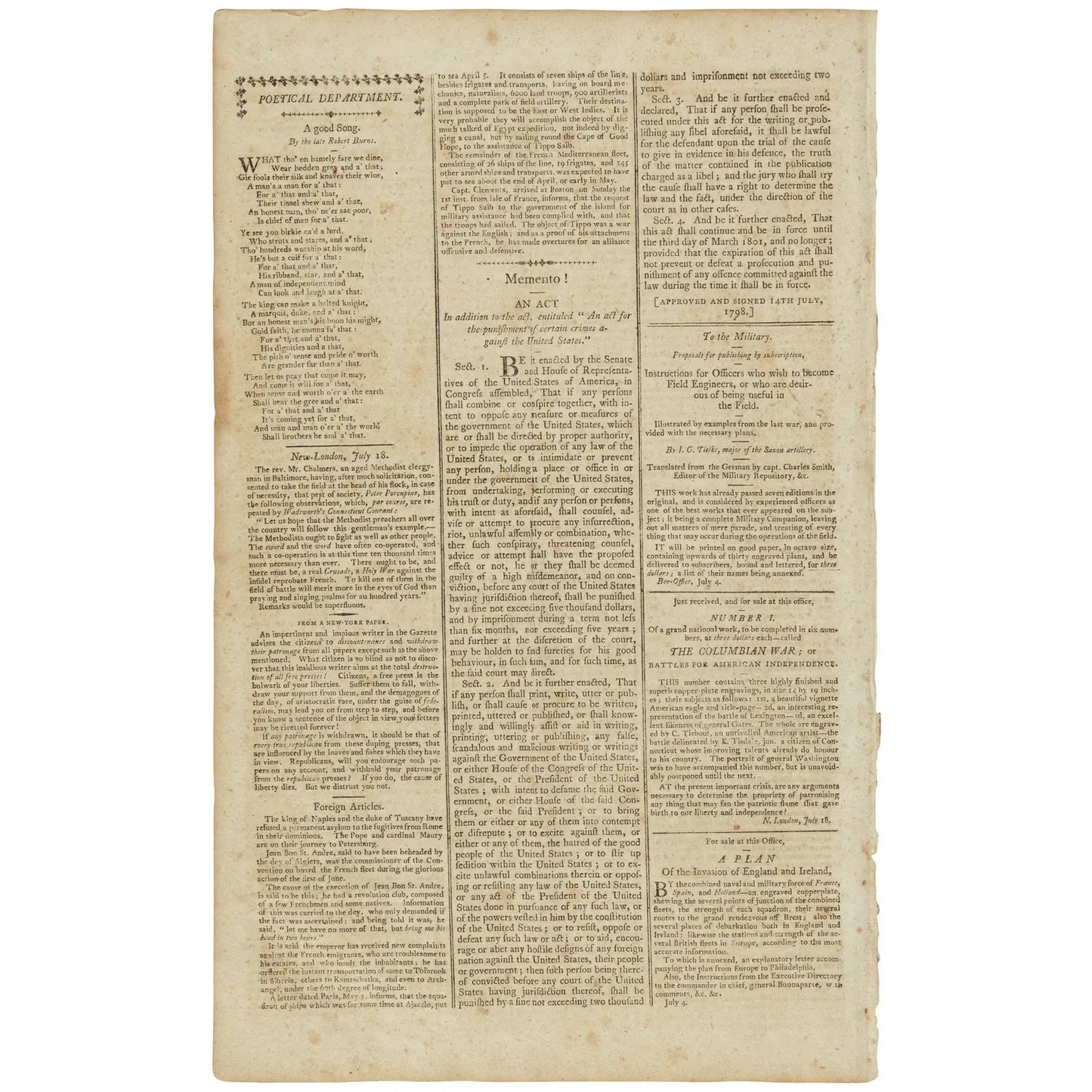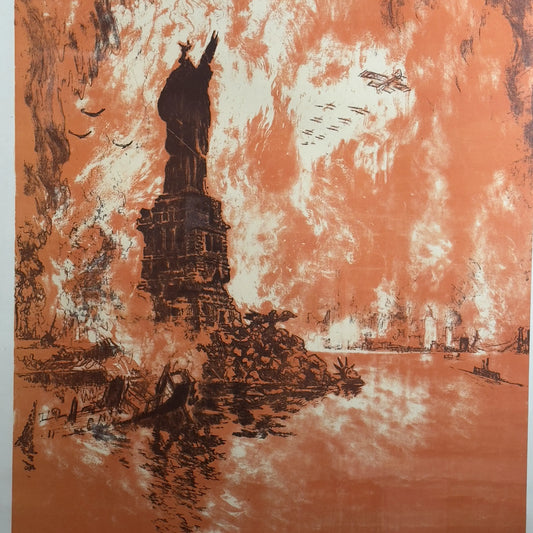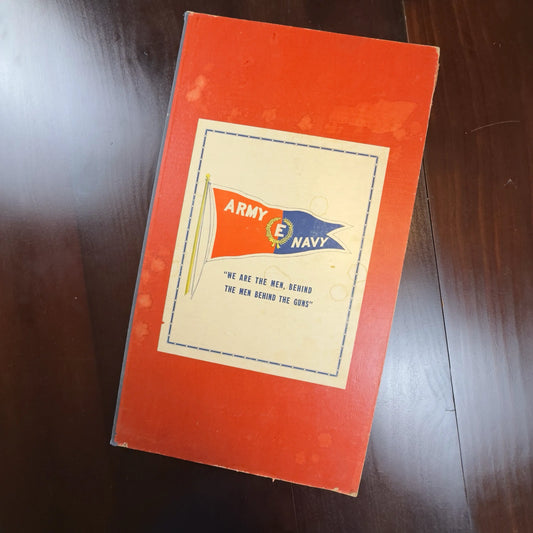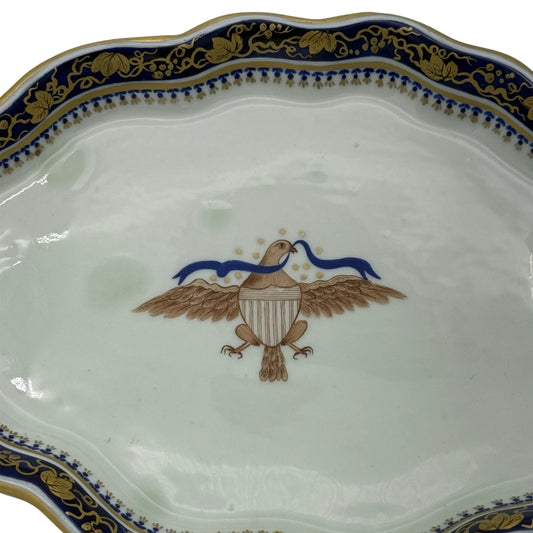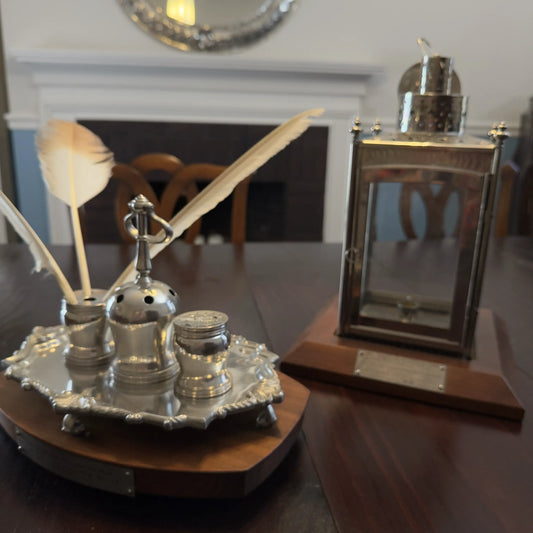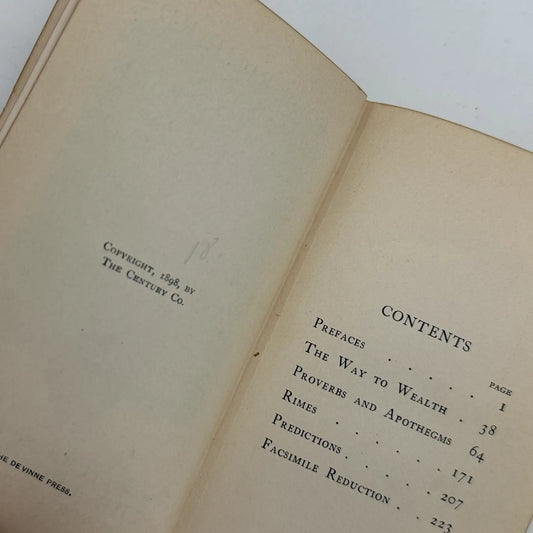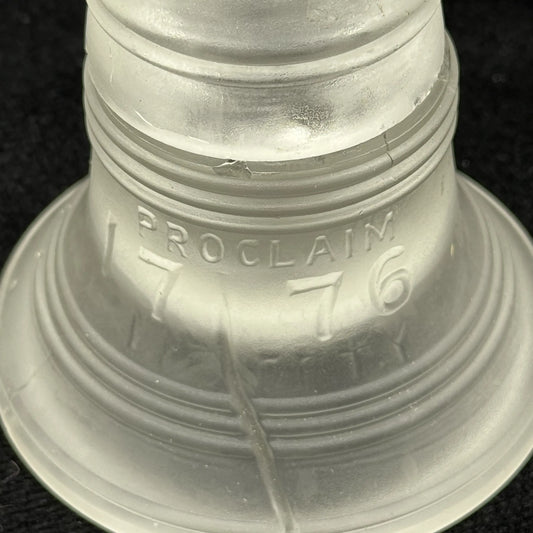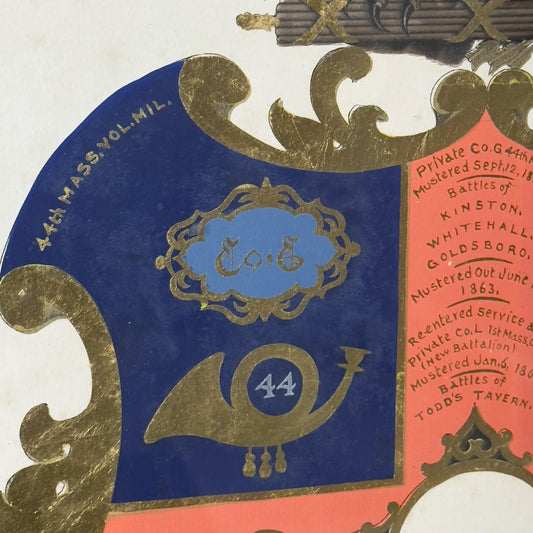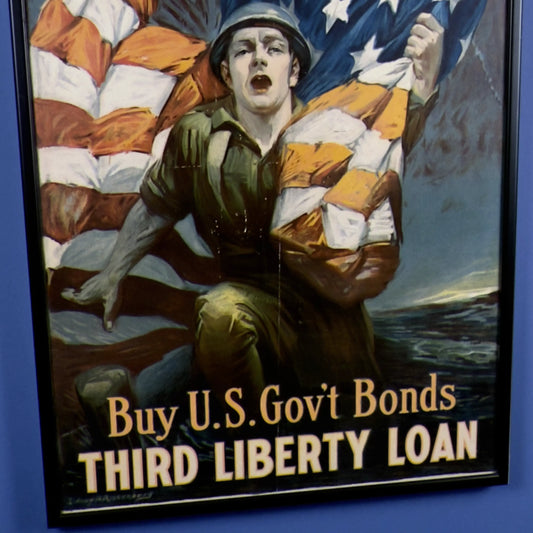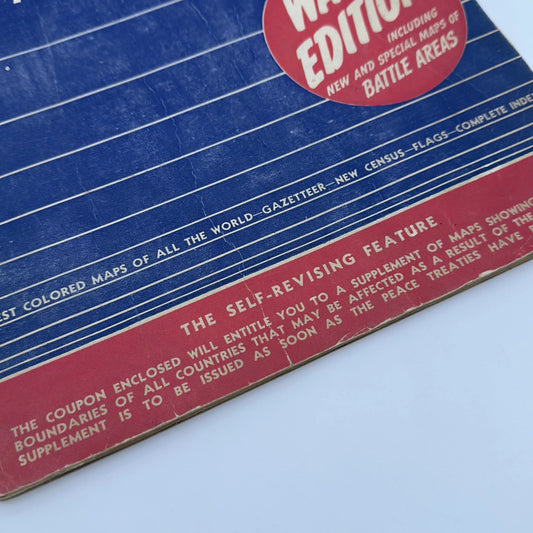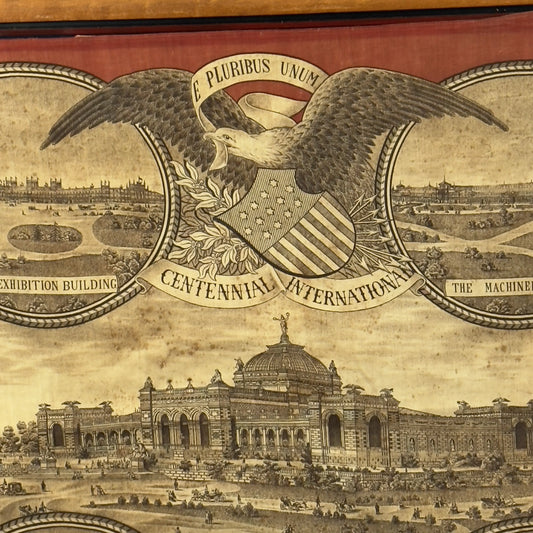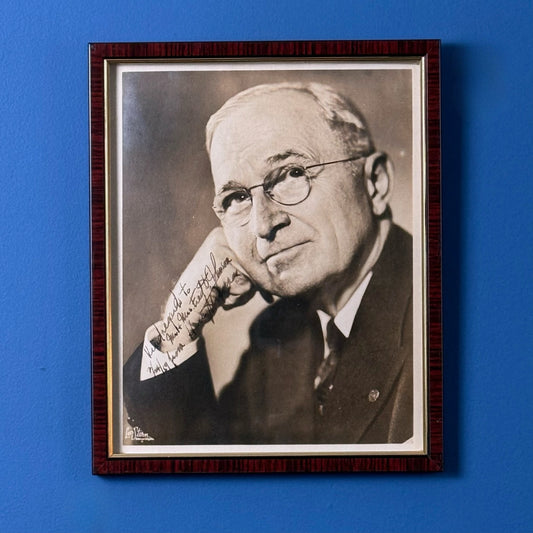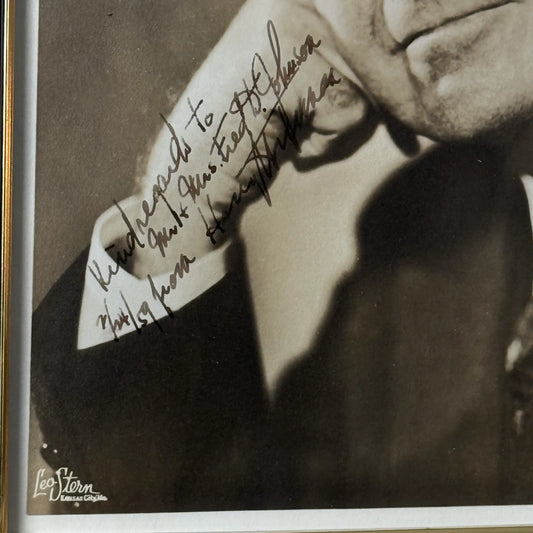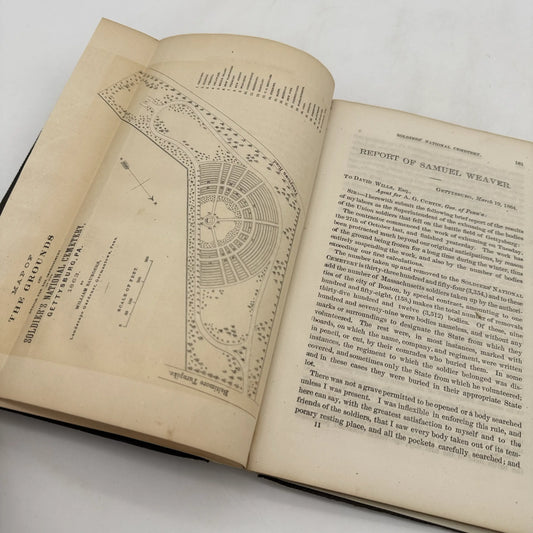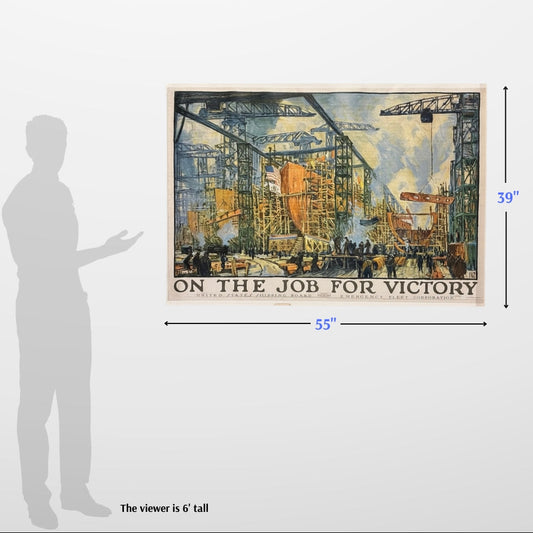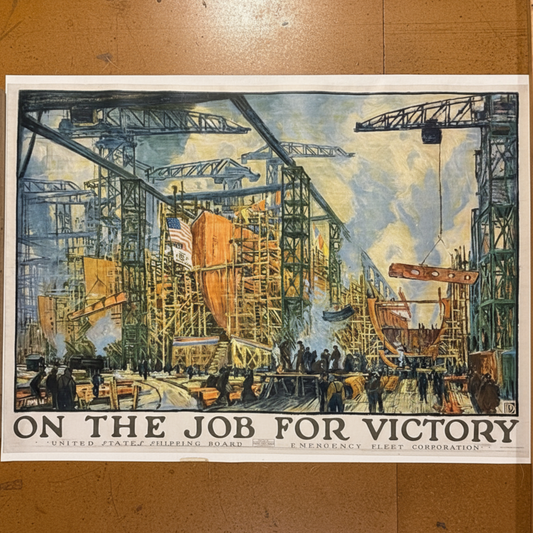1
/
of
20
John Adams and George Washington in "The New-London Bee" of July 25, 1798
John Adams and George Washington in "The New-London Bee" of July 25, 1798
$795.00
Couldn't load pickup availability
This is the New-London Bee of July 26, 1798. It contains news of a possible war and reports details I wasn’t familiar with. But before we get to that, you’ll appreciate how familiar the underlying claims are that began on the front page of The Bee (originally from the Vermont Gazette):
"Have not Congress given the President more power than the constitution of Great Britain allows the king?Have we not reason to believe that no qualification will recommend a person so well to the president for a commission as to be thoroughly established in the doctrine of non-resistance and passive obedience? When the president has got his army well establish-ed will he not be able to ram down stamp acts tax or any other tax whether we will or not . . .”
There are several interesting things in the paper, but the one of greatest historical importance is President John Adams reporting July 13 on the letter he received from former President George Washington who writes from Mount Vernon that he is accepting a commission to once again become the commander in chief of the army if war with France should break out. Also nearby, military appointments of Hamilton, Knox, Lee, and others. (A side note: The letter made it from Mount Vernon to Philadelphia in five days, not bad considering the maximum speed of transport then.)
Ron Chernow discusses Washington’s involvement and Hamilton's in a short video filmed at Mount Vernon.
The newspaper is offered in an archival portfolio. You could also have it framed, if you wished.
— Lee Wright | Founder
This newspaper includes letters between John Adams as President and ex-President George Washington, with Washington agreeing once again to take on the post of Lieutenant General of the U.S. Army during the undeclared naval war with France known as the Quasi-War. The photos below show the letter from Adams, which appears at the bottom of page two, and Washington's acceptance below that and continuing on to page three.
And while it's true that the content of primary interest is not on the front page, the masthead is so attractive and the paper is in such good shape, I would be tempted to frame it, but to do so in a way that would all you to take it out and look at it, too.
Four pages
Size: 4 pp.
Page size: 16.5" x 10"
About the Quasi-War
The Quasi-War was an undeclared war from 1798 to 1800 between the United States and French First Republic. It was fought almost entirely at sea, primarily in the Caribbean and off the East Coast of the United States, with minor actions in the Indian Ocean and Mediterranean Sea.
In 1793, Congress unilaterally suspended repayment of French loans from the American Revolutionary War, and in 1794 signed the Jay Treaty with Great Britain. Then engaged in the 1792 to 1797 War of the First Coalition, France retaliated by seizing U.S. ships trading with Great Britain. When diplomacy failed to resolve these issues, in October 1796 French privateers began attacking all merchant ships in U.S. waters, regardless of nationality.
Spending cuts following the end of the American Revolutionary War left the U.S. unable to mount an effective response, and within a year over 316 American ships had been captured. In March 1798, Congress reconstituted the United States Navy, and in July authorized the use of force against France. By 1799, losses had been significantly reduced through informal cooperation with the Royal Navy, whereby merchant ships from both nations were allowed to join each other's convoys.
The replacement of the French First Republic by the Consulate in November 1799 led to the Convention of 1800, which ended the war. The right of Congress to authorize military action without a formal declaration of war was later confirmed by the Supreme Court. This ruling formed the basis of many similar actions since, including U.S. participation in the Vietnam War and the Persian Gulf War.
Source: Wikipedia
The USS Constitution Museum has a good explanation of the Quasi War on their site.
https://ussconstitutionmuseum.org/major-events/the-quasi-war-with-france/
See below for the entire transcript
See below for the entire transcript
CONGRESSIONAL.
SENATE OF THE UNITED STATES.
July 18, 1798.
Gentlemen of the Senate.
"Believing that the letter received this morning from general Washington, will give high satisfaction to the Senate, I transmit them a copy of it, and congratulate them and the public on this great event ; the general's acceptance of his appointment, as lieutenant general and commander in chief of the army.
JOHN ADAMS.
United States,
July 17,'48."
Mount Vernon, 13th July, ’98.
Dear Sir,
I had the honor on the 11th instant, to receive from the hand of the secretary of war, your favor of the 7th, announcing that you had, with the advice and consent of the senate, appointed me, “lieutenant general and commander in chief of all the armies raised or to be raised for the service of the United States."
I cannot express how greatly affected I am at this new proof of public confidence, and the highly flattering manner in which you have been pleased to make the communication; at the same time I must not conceal my earnest wish, that the choice had fallen upon a man less declined in years, and better qualified to encounter the usual vicissitudes of war.
You know, sir, what calculations I had made relative to the probable course of events, on my retiring from office, and the determination I had consoled myself with, of closing the remnant of my days in my present peaceful abode: you will therefore be at no loss to conceive and appreciate the sensations I must have experienced, to bring my mind to any conclusion that would pledge me, at so late a period of life, to leave scenes I sincerely love, to enter upon the boundless field of public action, incessant trouble, and high responsibility.
It was not possible for me to remain ignorant of, or indifferent to recent transactions. The conduct of the directory of France towards our country; their insidious hostility to its government; their various practices to withdraw the affections of the people from it; the evil tendency of their acts, and those of their agents, to countenance and invigorate opposition ; their disregard of solemn treaties and the laws of nations ; their war on our defenceless commerce ; their treatment of our ministers of peace; and their demands, amounting to tribute, could not fail to excite in me corresponding sentiments with those my countrymen liave so generally expressed in their affectionate addresses to you.
Believe me, sir, no one can more cordially approve of the wise and prudent measures of your administration. They ought to inspire universal confidence, and will, no doubt, combined with the state of things, call from Congress such laws and means as will enable you to meet the full force and extent of the crisis.
Satisfied, therefore, that you have sincerely wished and endeavoured to avert war, and exhausted to the last drop, the cup of reconciliation; we can, with pure hearts, appeal to Heaven for the justice of our cause ; and may confidently trust the final result to that kind Providence, who has heretofore, and so often signally favored the people of these United States.
Thinking in this manner, and feeling how incumbent it is upon every person, of every description, to contribute at all times to his country's welfare, and especially in a moment like the present, when everything we hold dear and sacred is so seriously threatened. I
Thinking in this manner, and feeling how incumbent it is upon every person, of every description, to contribute at all times to his country's welfare, and especially in a moment like the present, when every thing we hold dear and sacred is so seriously threatened, I have firmly determined to accept the commission of commander in chief of the armies of the United States ; with the reserve only, that I shall not be called into the field until the army is in a situation to require my presence, or it becomes indispensible by the urgency of circumstances.
Thinking in this manner, and feeling how incumbent it is upon every person, of every description, to contribute at all times to his country's welfare, and especially in a moment like the present, when every thing we hold dear and sacred is so seriously threatened, I have firmly determined to accept the commission of commander in chief of the armies of the United States ; with the reserve only, that I shall not be called into the field until the army is in a situation to require my presence, or it becomes indispensible by the urgency of circumstances.
In making my reservation, I beg to be understood, that I do not mean to withhold any assistance to arrange and organize the army, which you may think I can afford. I take the liberty also to mention, that I must decline having my acceptance considered as drawing after it any charge upon the public, or that I can receive any emolument annexed to the appointment, before entering into a situation to incur expence.
The secretary of war being anxious to return to the seat of government, I have detained him no longer than was necessary to fill a communication upon the several points he had in charge.
With very great respect and consideration,
I have the honor to be,
Dear Sir,
Your most obedient humble servant,
G. WASHINGTON.
JOHN ADAMS,
President of the United States."
Dear Sir,
Your most obedient humble servant,
G. WASHINGTON.
JOHN ADAMS,
President of the United States."
Shipping: $15. Please allow two weeks for shipping.
Made by America
Made by America
Almost all of the new products we offer are designed by us and made in America and most of our Rare Finds were made in America.
Our original designs are based on our nation’s history and our love of American history. Read more about other things we've created, including The History List, History Camp, and The Pursuit of History, in addition to The History List Store.
Every product that is made in America states that in the product description and includes the "Made in U.S.A." graphic.
